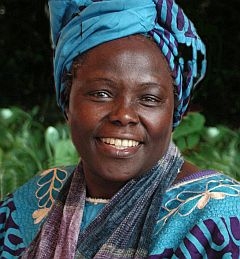 (Host) A documentary by two Marlboro Vermont film makers has been winning awards on the independent film circuit.
(Host) A documentary by two Marlboro Vermont film makers has been winning awards on the independent film circuit.
It’s called "Taking Root: the Vision of Wangari (Wan GARR-ee Mah-THIGH) Maathai. It tells the story of the Kenyan woman who won the Nobel Peace Prize in 2004.
Maathai touched off a transformation in her country by encouraging rural women to plant trees. VPR’s Susan Keese has more.
(Keese) During the years it took to make this film, Lisa Merton says she and her partner Alan Dater, often asked themselves why two Vermonters should be making a documentary set in Africa.
The couple and their company, Marlboro Productions, had made award winning films before. They’d been hired to do a 15 minute spot on the founder of Kenya’s Greenbelt movement, Wangari Maathai. But when they met Maathai at the Yale School of Forestry in 2002, they realized that a bigger film would be necessary..
(Merton) her story was so compelling and her presence was so powerful that we said we can’t make a film about her without seeing her land and where she comes from and what she does and meeting the women of the Greenbelt movement. In a way she personified everything that we believed in. And there it was in this one story.
(Keese)The documentary begins with an African child stopping to play with frogs eggs while drawing water from a sparkling pool…and maathai talking about her own childhood.
(Maathai) I grew up in the countryside, and as a small young girl there was a huge tree that was near our homestead and next to the tree was a stream. My mother told me, Do not collect the firewood from the fig tree by the stream. I said why? And she said because that tree is a tree of god….
(Keese) Maathai says in the film that she had to go to college before she understood that the water in the stream traveled up the roots of the fig tree from deep in the earth.
Her research at the university took her to the bush, where the rainforest was being rapidly denuded. In her own village the fig tree had been cut and the stream had vanished.
According to Merton, Maathai was also hearing complaints from women.
(Merton) about malnutrition, about dirty water, about walking long distances for firewood. That was probably the primary thing, was that they couldn’t cook foods that took a long time to cook like beans where the protein is, because they didn’t have enough firewood.
(Maathai in movie) That’s what gave me an idea. Why not plant trees, I asked the women. Let’s plant trees!
(Keese) The planting of trees planted other seeds as well. People began asking questions about who controlled the country’s resources and why they were poor, and about women’s rights. Fallout from these questions got Maathai into plenty of trouble with the Kenyan government along the way to the Nobel Peace Prize.
Merton recalls being wakened by a call at 4 am one morning in 2004 with the news that Maathai had won the Prize. Suddenly everyone wanted to interview their subject.
(Dater) For the most part she told them, Here are these film makers who have been working on this film. We’re going to keep working with them.
(Keese) Merton and Dater say that was a big responsibility. But they were willing to take it on because it makes the point that all life is connected. As Maathai says, If we destroy the natural world that sustains us, we are digging our own graves.
For VPR News, I’m Susan Keese.
(Outro) "Taking Root" is showing through January 15 at the Latchis Theater in Brattleboro and will be aired on PBS in April.